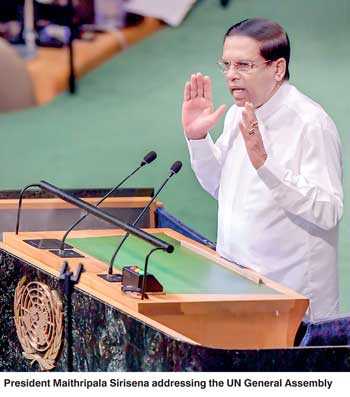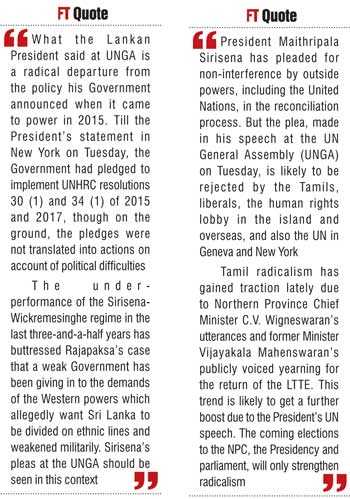Wednesday Feb 18, 2026
Wednesday Feb 18, 2026
Saturday, 29 September 2018 00:10 - - {{hitsCtrl.values.hits}}
 It is generally stated by liberals and the human rights community that for Sri Lanka to achieve ethnic reconciliation, the Government will have to implement Resolution 30 (1) and 34 (1) passed by the UN Human Rights Council (UNHRC) in 2015 and 2017 respectively.
It is generally stated by liberals and the human rights community that for Sri Lanka to achieve ethnic reconciliation, the Government will have to implement Resolution 30 (1) and 34 (1) passed by the UN Human Rights Council (UNHRC) in 2015 and 2017 respectively.
But given the political difficulties faced by the Government in implementing them, President Maithripala Sirisena has added a further requirement, and a critical one at that, to bring about reconciliation. He has pleaded for non-interference by outside powers, including the United Nations, in the reconciliation process.
But the plea, made in his speech at the UN General Assembly (UNGA) on Tuesday, is likely to be rejected by the Tamils, liberals, the human rights lobby in the island and overseas, and also the UN in Geneva and New York.
For the Tamils, it will be a return to a bitter past in which they had tried to solve the ethnic issue within Sri Lanka, with Lankan governments and Sinhalese parties, and failed miserably. As Suresh Premachandran of the Eelam People’s Revolutionary Liberation Front (EPRLF) once said: “Sri Lanka has proved beyond doubt that the Tamil issue cannot be settled without outside intervention.”
The President’s plea has also come at a time when the Northern Provincial Council (NPC), an elected body, has unanimously asked the UN to refer cases of alleged war crimes against members of the Lankan armed forces to the International Criminal Court (ICC); to impose targeted sanctions against Lankan army personnel; and to conduct a referendum among North-Eastern Tamils on the kind of political structure they wish to live under.
Tamil radicalism has gained traction lately due to Northern Province Chief Minister C.V. Wigneswaran’s utterances and former Minister Vijayakala Maheswaran’s publicly voiced yearning for the return of the LTTE. This trend is likely to get a further boost due to the President’s UN speech. The coming elections to the NPC, the Presidency and parliament, will only strengthen radicalism.
Tamil nationalism offers fertile soil for the growth of Sinhalese majoritarian nationalism, which is a bigger challenge to the Government than Tamil nationalism. Sinhalese nationalism has to be appeased for political survival.
Hemmed in on all sides, the President sought a way out. To him, the way out was to seek the removal of a major irritant in the reconciliation process, namely, foreign participation or intervention. In the 1980s, Indian intervention had worsened the situation in the island. Norwegian and Japanese efforts in the 2000s had only sharpened the ethnic divide. UN intervention since 2009 had not borne fruit. It had only widened the ethnic gulf.
President Sirisena, like other Sinhalese nationalists, feels that foreign intervention has only added new dimensions to the conflict and undermined indigenous efforts to bring about reconciliation.
 This is what made him make a fervent plea at UNGA on Tuesday. Sirisena asked member-nations to respect national sovereignty when it intervenes in other countries to settle disputes, enforce human rights or bring about reconciliation.
This is what made him make a fervent plea at UNGA on Tuesday. Sirisena asked member-nations to respect national sovereignty when it intervenes in other countries to settle disputes, enforce human rights or bring about reconciliation.
“With respect, I request to let us solve our problems. Independence of a country is very important,” Sirisena said.
“As a sovereign state, we need no foreign influence or threats. As such, I reiterate my request to all, as a strong nation, that allow us to sort out our problems as a sovereign nation, that moves forward while protecting our rights.”
“I respectfully request the support of everybody as we will solve the problems that need to be solved as Sri Lankans. We also need your cooperation in my Government’s mission to erase doubt, fear and mistrust among communities living in my beloved motherland, while nurturing lasting peace among all communities,” he added.
Seeking international recognition and appreciation for the role of the much maligned Sri Lankan armed forces in defeating terrorism and separatism, Sirisena said: “It was one of the world’s strongest terrorism groups that the Armed Forces of Sri Lanka eradicated. It is thanks to that achievement that Sri Lanka remains an unbroken, non-divided country with permanent peace.”
“Our armed forces have contributed immensely to building lasting peace in Sri Lanka by defeating a strong terrorism organisation. I mention this achievement with respect and thank Sri Lanka’s armed forces for their dedication to bring lasting peace and protect the unitary state of Sri Lanka.”
Radical departure
What the Lankan President said at UNGA is a radical departure from the policy his Government announced when it came to power in 2015. Till the President’s statement in New York on Tuesday, the Government had pledged to implement UNHRC resolutions 30 (1) and 34 (1) of 2015 and 2017, though on the ground, the pledges were not translated into actions on account of political difficulties.
For fear of losing popular support, it has been unwilling to drag its armed forces personnel before special judicial mechanisms in which there will be foreign judges, prosecutors and forensic experts.
The Government, the Sinhalese opposition parties, and the Sinhalese majority at large, could not for a moment entertain the thought that their soldiers might have committed crimes in the process of eliminating the LTTE.
 Excesses were deemed to be natural in the fog of war and acceptable in a fight against an exceptionally brutal militant group which was brazenly using human shields, human bombs and child soldiers, and with no compunction about planting deadly bombs in public places like railway stations, buses and banks aimed at killing innocent civilians.
Excesses were deemed to be natural in the fog of war and acceptable in a fight against an exceptionally brutal militant group which was brazenly using human shields, human bombs and child soldiers, and with no compunction about planting deadly bombs in public places like railway stations, buses and banks aimed at killing innocent civilians.
The Government was finding it difficult to keep its pledge to find out the fate of the thousands of Tamils who had disappeared. It had only recently set up an Office of Missing Persons.
The police have been unable to pursue cases against armed forces personnel in abduction and elimination cases because the President had expressed opposition to detaining them for long without being charged as this could affect the forces’ morale.
Persistent fear of the resurgence of Tamil militancy has stalled reform of the anti-terror law. The whitewashing of the brutality of the LTTE by the UN has made the transitional justice mechanisms suggested by the UNHRC seem iniquitous and potentially dangerous.
The under-performance of the Sirisena-Wickremesinghe regime in the last three-and-a-half years has buttressed Rajapaksa’s case that a weak Government has been giving in to the demands of the Western powers which allegedly want Sri Lanka to be divided on ethnic lines and weakened militarily.
Sirisena’s pleas at the UNGA should be seen in this context. In his view, an end to, or mitigation of, foreign involvement will remove a major irritant and divider in Sri Lanka and allow Sri Lankans to devise their own means to facilitate reconciliation through mutual discussions and adjustments.
Past failures of such efforts cannot be an excuse for not taking this route as conditions have changed. Sirisena believes that domestic issues are best solved within the country if a lasting solution is to be arrived at.
The President has however clarified that he is not totally against UN or outside involvement. His plea is that the involvement should only be to facilitate the implementation of schemes and agreements worked out by Sri Lankans themselves. For example, Sirisena would like foreign donors to help rehabilitate families whose kith and kin had gone missing.